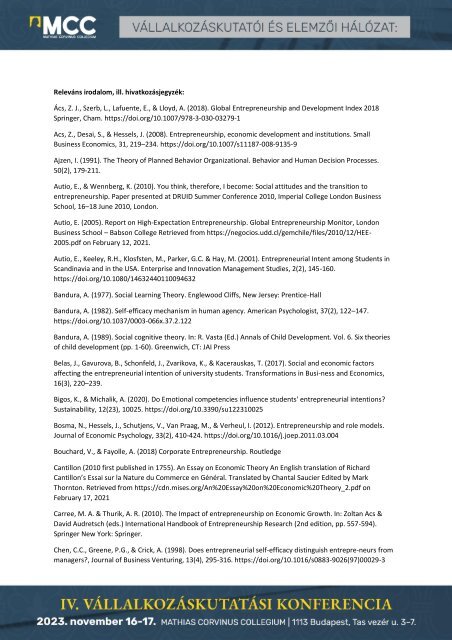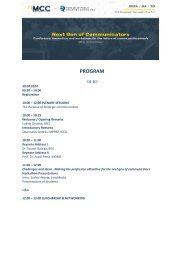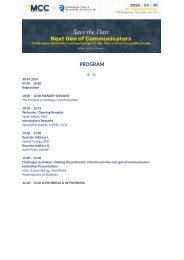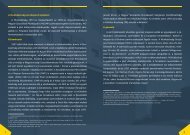IV. Vállalkozáskutatási Konferencia
Create successful ePaper yourself
Turn your PDF publications into a flip-book with our unique Google optimized e-Paper software.
Releváns irodalom, ill. hivatkozásjegyzék:<br />
Ács, Z. J., Szerb, L., Lafuente, E., & Lloyd, A. (2018). Global Entrepreneurship and Development Index 2018<br />
Springer, Cham. https://doi.org/10.1007/978-3-030-03279-1<br />
Acs, Z., Desai, S., & Hessels, J. (2008). Entrepreneurship, economic development and institutions. Small<br />
Business Economics, 31, 219–234. https://doi.org/10.1007/s11187-008-9135-9<br />
Ajzen, I. (1991). The Theory of Planned Behavior Organizational. Behavior and Human Decision Processes.<br />
50(2), 179-211.<br />
Autio, E., & Wennberg, K. (2010). You think, therefore, I become: Social attitudes and the transition to<br />
entrepreneurship. Paper presented at DRUID Summer Conference 2010, Imperial College London Business<br />
School, 16–18 June 2010, London.<br />
Autio, E. (2005). Report on High-Expectation Entrepreneurship. Global Entrepreneurship Monitor, London<br />
Business School – Babson College Retrieved from https://negocios.udd.cl/gemchile/files/2010/12/HEE-<br />
2005.pdf on February 12, 2021.<br />
Autio, E., Keeley, R.H., Klosfsten, M., Parker, G.C. & Hay, M. (2001). Entrepreneurial Intent among Students in<br />
Scandinavia and in the USA. Enterprise and Innovation Management Studies, 2(2), 145-160.<br />
https://doi.org/10.1080/14632440110094632<br />
Bandura, A. (1977). Social Learning Theory. Englewood Cliffs, New Jersey: Prentice-Hall<br />
Bandura, A. (1982). Self-efficacy mechanism in human agency. American Psychologist, 37(2), 122–147.<br />
https://doi.org/10.1037/0003-066x.37.2.122<br />
Bandura, A. (1989). Social cognitive theory. In: R. Vasta (Ed.) Annals of Child Development. Vol. 6. Six theories<br />
of child development (pp. 1-60). Greenwich, CT: JAI Press<br />
Belas, J., Gavurova, B., Schonfeld, J., Zvarikova, K., & Kacerauskas, T. (2017). Social and economic factors<br />
affecting the entrepreneurial intention of university students. Transformations in Busi-ness and Economics,<br />
16(3), 220–239.<br />
Bigos, K., & Michalik, A. (2020). Do Emotional competencies influence students' entrepreneurial intentions?<br />
Sustainability, 12(23), 10025. https://doi.org/10.3390/su122310025<br />
Bosma, N., Hessels, J., Schutjens, V., Van Praag, M., & Verheul, I. (2012). Entrepreneurship and role models.<br />
Journal of Economic Psychology, 33(2), 410-424. https://doi.org/10.1016/j.joep.2011.03.004<br />
Bouchard, V., & Fayolle, A. (2018) Corporate Entrepreneurship. Routledge<br />
Cantillon (2010 first published in 1755). An Essay on Economic Theory An English translation of Richard<br />
Cantillon’s Essai sur la Nature du Commerce en Général. Translated by Chantal Saucier Edited by Mark<br />
Thornton. Retrieved from https://cdn.mises.org/An%20Essay%20on%20Economic%20Theory_2.pdf on<br />
February 17, 2021<br />
Carree, M. A. & Thurik, A. R. (2010). The Impact of entrepreneurship on Economic Growth. In: Zoltan Acs &<br />
David Audretsch (eds.) International Handbook of Entrepreneurship Research (2nd edition, pp. 557-594).<br />
Springer New York: Springer.<br />
Chen, C.C., Greene, P.G., & Crick, A. (1998). Does entrepreneurial self-efficacy distinguish entrepre-neurs from<br />
managers?, Journal of Business Venturing, 13(4), 295-316. https://doi.org/10.1016/s0883-9026(97)00029-3















